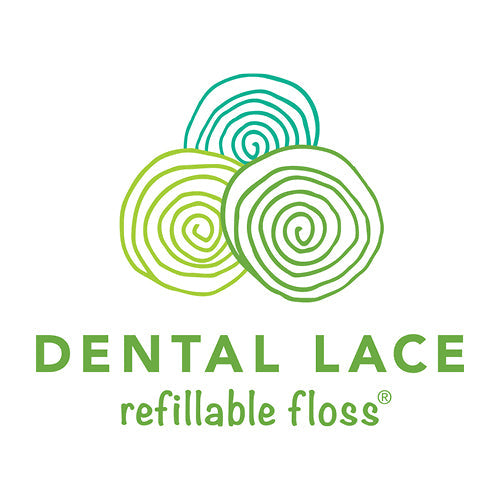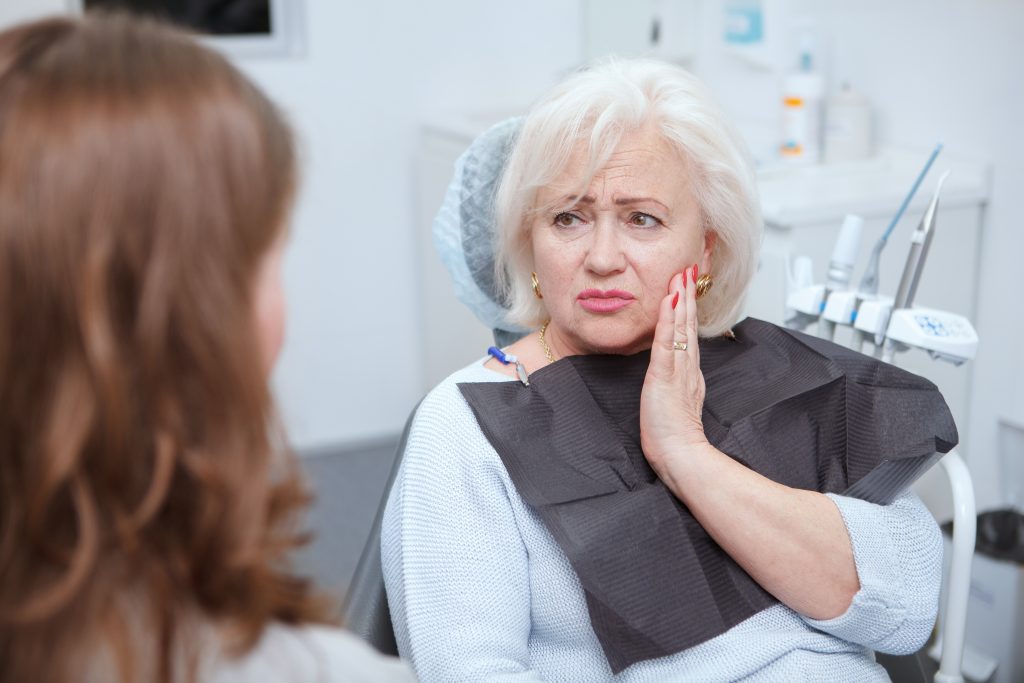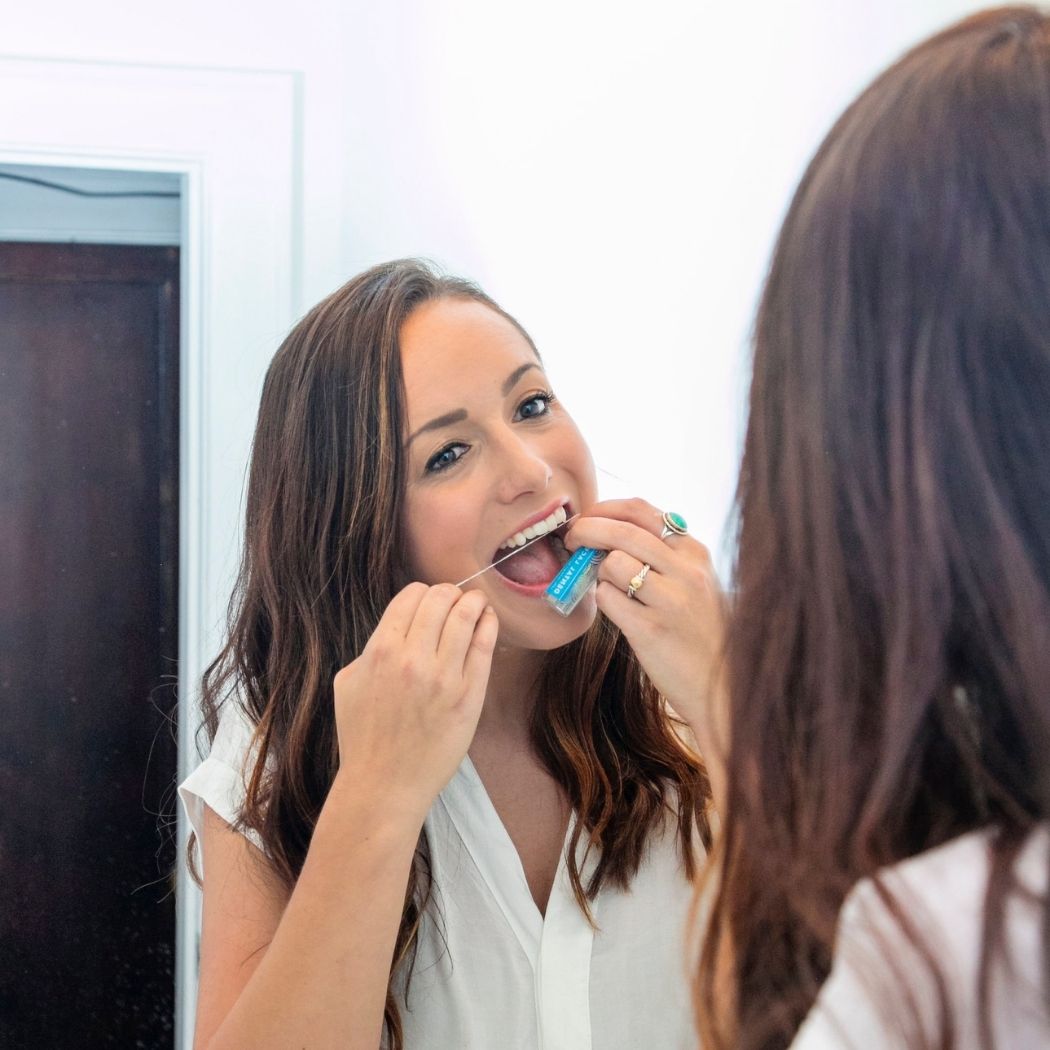
Seniors and Dental Health:
A Comprehensive Guide to a Healthy Mouth
Guest Blog: from Caring.com
Many adults have fond memories of walking into their grandparents’ bedroom as children, only to see grandma’s teeth in a cup by her bedside table. This common scenario leads to many interesting questions from young children, but it also hides a serious health concern. While dentures can be common in some older adults, they are more than just a funny family story. They’re a sign that older adults are at higher risk for oral health problems, including tooth decay and loss.
Oral health is about more than just aesthetics and the ability to eat. Gum disease and tooth decay actually increase the risk of other health problems, including cardiovascular disease and bacterial infections. Sadly, over half of all older adults, 68% to be exact, suffer from gum disease, and nearly 20% have untreated cavities. Oral health and the resulting health problems are serious risks for older adults.
This guide explores some of the reasons seniors are at such high risk for oral health problems. It also looks at solutions to some of those problems, while giving tips on dental hygiene for older adults. Finally, it provides a list of low-cost resources for seniors who cannot afford dental care.
Seniors and the Risk for Oral Health Problems
Older adults face unique challenges that make it harder for them to keep their teeth and gums healthy. Yet without proper dental care, they’re at higher risk for serious medical issues beyond just the teeth and gums. Understanding these risk factors may help you find ways to overcome them as you assist the senior in your life in embracing good oral health. Here are some of the common reasons why older adults don’t get the dental care they need.
1. Lack of Access
The most recent study available in the National Library of Medicine on barriers to dental care in older adults was done in 2014. The study found that in a pool of 184 older adults, 89% needed dental treatments. Of those who needed treatment, nearly half had not had it. Lack of access is one of the most often cited reasons for this.
Access to dental care comes in one of two forms. First, access requires transportation. Many older adults lack reliable transportation and are unable to drive themselves to the dentist’s office. While many assisted living and nursing home facilities have visiting doctors or provide transportation to doctor’s offices, access to dentists can be limited in some communities, making access challenging.
Lack of access can also refer to a lack of dental insurance. Many insurance products aimed at older adults have limited dental coverage. Medicare doesn’t cover dental services, for example, and less than half of all Medicaid state plans cover comprehensive dental care. Without insurance, seniors must pay out of pocket for this care, which is a barrier to accessibility.
2. Cost of Dental Care
Without insurance coverage for dental care, the cost can be unmanageable for some seniors. The Kaiser Family Foundation found that the average Medicare beneficiary has to spend $922 each year out of pocket on their dental care needs, and 19% of Medicare beneficiaries in the study spent over $1,000 on their oral health care in the survey year. For seniors on a fixed income, this cost may be impossible.
3. Long-Term Effects of Poor Oral Health Care Over a Lifetime
Another reason that seniors face such high costs for their dental care is the long-term effects of poor oral health care over their lifetimes. The CDC estimates that nearly all adults 65 and older have had a cavity, and 1 in 5 have an untreated source of tooth decay. This decay may be due to poor oral hygiene when the senior was young, and the cost may prevent treatment now.
The longer these problems are left untreated, the worse they get. Where a young adult may receive treatment for a minor issue, if that issue gets left untreated for decades, it can lead to root damage, gum disease and tooth loss.
4. Medical Conditions That Affect the Teeth and Gums
As people age, the risk of developing a wide range of health conditions increases. Some directly impact the teeth and gums, while others have an indirect effect. For example, hypertension and diabetes are both connected with an increased risk for oral diseases, according to the National Institutes of Health.
Conditions that affect the joints, like rheumatoid arthritis, can make it more difficult for seniors to brush and floss. Nervous system diseases, such as Parkinson’s disease, may also make brushing and flossing difficult. Cognitive conditions, like Alzheimer’s and other forms of dementia, may increase the risk that a senior won’t take care of their teeth.
5. Medications That Affect the Teeth and Gums
Many older adults take medications for health conditions that can affect the teeth and gums. Dry mouth is a common side effect of many medications. Some classes of medication that can cause this problem include:
- Anticholinergics (used for asthma and overactive bladder)
- Antidepressants (used for depression and anxiety)
- Opioids (used for pain, like arthritis pain)
- Antipsychotics (used for mental health concerns)
- Some blood pressure medications
- Some muscle relaxants
Dry mouth is more than just a nuisance. According to Mayo Clinic, it can cause a range of problems, including increased plaque, gum disease and tooth decay.
Common Oral Problems in Seniors
Lack of access to professional dental care and poor home care of the teeth, combined with medications and medical conditions, put seniors at risk for a wide range of oral problems. If you care for a senior, you should be aware of what these are so you can watch for them. Linked below is a table of the most common oral problems in seniors with information about their impact.
Warning Signs of Unhealthy Teeth and Gums in Seniors
Whether you’re a senior yourself or you have a senior you care for, knowing signs of unhealthy teeth and gums is essential. You need to know when it’s time to get dental care because leaving problems untreated will make them worse. Some warning signs to watch for include:
- Tooth pain: Tooth pain is one of the first signs of a problem. This pain can come from tooth decay, gum recession, lesions and even from food stuck in the gums.
- Bleeding gums: Bleeding indicates inflammation of the gums. If it happens regularly, it may be a sign of gum disease. It can also be a sign of other health concerns, such as anemia and diabetes.
- Receding gums: If the gums are pulling away from the teeth, it can indicate gum disease. This issue can also cause increased sensitivity of the teeth, causing pain.
- Difficulty moving the jaw or tongue: If the jaw or tongue is causing pain, it may be due to an oral health problem, such as an infected salivary duct caused by bacteria accumulation in the mouth from a decaying tooth.
- Bad breath: Everyone has bad breath from time to time, but if brushing and flossing don’t solve the problem, it can indicate a more serious issue.
- Change in the fit of dentures: If dentures start to fit uncomfortably or differently than they once did, it may be a sign of an oral health concern. This may be due to swollen gum tissue.
Oral Hygiene Tips for Seniors
Follow the link below for tips to establish a dental routine and and healthy lifestyle to ensure you're doing everything possible to maintain your dental health.
When Is It Time to See a Dentist?
Seniors should have routine oral care checkups twice a year, but problems can still arise outside of these parameters. It’s time to see a dentist when a senior experiences:
- A tooth that breaks
- Tooth or gum pain that isn’t relieved after a day or two
- Sores in the mouth that don’t heal within a week
- Gums that regularly bleed
- Sudden discoloration of the teeth
- Dry mouth
- Teeth that fall out
- Discomfort from dentures or other oral appliances
Paying for Dental Care

Dental care is important for seniors and their overall well-being, and many struggle to find a way to pay for it. Thankfully, some programs may help. These include:
Original Medicare
Original Medicare doesn’t offer coverage for general dental care, including:
- Cleanings
- Fillings
- Tooth extractions
- Dentures
- Dental plates
However, Medicare Part A covers any dental services that require a hospital stay or that take place while the senior is in the hospital. Complicated dental procedures or procedures that require the patient to go under general anesthetic may fall in this category.
The Cost of Dental Care Under Original Medicare
Under Original Medicare, seniors pay 100% of their dental care costs.
How to Apply for Medicare
Here are the steps to apply for Original Medicare:
- You will get Part A automatically if you receive Social Security.
- Visit Social Security’s website to sign up for Medicare Part B through the my Social Security account.
- You can also call 1-800-772-1213 or visit the local Social Security office to apply.
- Receive your welcome package from Medicare 2 weeks after applying.
Medicare Advantage Plans
One option for seniors who qualify for Medicare and want oral health coverage is a Medicare Advantage Plan, also known as Medicare Part C. These plans allow a senior to sign up for Medicare through private insurance providers instead of Original Medicare. Many Medicare Advantage Plans cover vision, hearing or dental.
The Cost of Dental Care Under Medicare Advantage Plans
The cost of dental care is based on the plan’s out-of-pocket limits, copays and deductibles and varies from plan to plan.
How to Apply for Medicare Advantage
To apply for a Medicare Advantage Plan, you must:
- Apply for Original Medicare to get a Medicare Number and start date.
- Visit Medicare’s Plan Finder to find a plan that fits your needs.
- Apply for the plan based on its rules and guidelines.
- Call the plan directly to let them know you want to join.
- Call 1-800-MEDICARE to make the switch.
- Contact SHIP, a free counseling service for Medicare recipients, as an alternative to the above steps.
Medicaid
Medicaid is a state-based insurance program for low-income individuals, which includes many seniors or adults living with disabilities. The coverage options for Medicaid vary greatly from state to state. Federal guidelines don’t require dental coverage, but some states do cover dental care. Most states provide emergency dental services under their Medicaid plans.
The Cost of Dental Care Under Medicaid
The cost of your dental care under Medicaid depends on the terms of your state’s Medicaid program.
How to Apply for Medicaid
To apply for Medicaid, you can take two routes:
- Apply through your state’s Medicaid agency.
- Apply for health coverage through the Health Insurance Marketplace, which automatically applies you for Medicaid if you qualify.
Veterans Benefits
Many seniors who are qualified military veterans can receive dental care benefits through the VA dental benefits plan. Eligible veterans can visit a VA dental clinic to receive care, and for some, that care is comprehensive.
The Cost of Dental Care under VA Dental Care Benefits
The benefits available to veterans vary depending on many factors, including:
- Disability rating
- Veterans benefit class
- Amount of service
- Reason for discharge
Coverage options range from comprehensive dental coverage to a one-time dental care visit, depending on the class and rating.
How to Apply for VA Dental Benefits
To qualify for VA dental benefits, you need to know your military service history and current health and financial information. Then follow these steps:
- Visit VA.gov to check your eligibility for VA health care benefits.
- Supply your Social Security number, military discharge information, insurance cards and income statements.
- Fill in the online application.
- Receive notice of what you qualify for, which may include dental benefits.
- Call MyVA411 at 800-698-2411 if you need help.
- Visit your local Veterans Service Organization for in-person application help.
Private Dental Insurance
While it’s not a low-cost option for most seniors, you do have the option to purchase dental insurance through private insurance providers. These plans vary significantly in what they cover and what the senior’s out-of-pocket costs are, and you need to read them carefully. You also need to weigh the cost of premiums against the covered benefits.
The Cost of Dental Care under Private Dental Insurance
If you have private dental insurance, your costs are going to vary. Some things that may impact your out-of-pocket costs include:
- Deductible
- Co-insurance costs
- Copays
- Excluded services
In addition, you pay premiums for the insurance.
Free and Low-Cost Dental Care for Low-Income Seniors
The cost of dental care is one of the biggest barriers many seniors face, but there are national resources beyond Medicaid and Medicare to help with this cost. Below are some options that offer free or low-cost dental care for seniors based on financial need.
Dental Lifeline
Dental Lifeline Network has a network of volunteer dentists who provide free dental care to vulnerable populations, including low-income elderly adults. These programs are available to those who cannot afford care and also can’t get care through public aid venues.
How to Apply
All applications for Dental Lifeline Network services have to come through a Donated Dental Services Coordinator. The program also has a set list of eligibility requirements for all states. If you fit one of the following qualifications, you can apply for services:
- Are 65 or older
- Are considered medically fragile
- Have a permanent disability
Several states have long wait lists for services and limit applications to specific counties. The table linked below lists the contact information for each state’s program. You will also find information on what areas of the state are accepting applications. Keep in mind that seniors who have a note from their doctor stating that oral care is medically necessary may be able to apply even if their state or county is closed.
United Way
The United Way is a nonprofit organization that helps low-income individuals access the health care services they need. Many seniors qualify for help from the United Way, which has chapters all across the United States. Currently, the United Way serves 1,800 communities across the globe.
Each individual United Way chapter has its specific regulations and services, and you need to find the local chapter in the area where the senior lives. Many offer free and low-cost dental services through partnerships with local volunteer dentists.
How to Apply for United Way
To find your local United Way chapter, visit the United Way website and search via zip code, which brings up the contact information for the local branch. Check with your local branch to learn about dental care options and discounts, and they will tell you how to apply.
Get Dental Care at Dental Schools
Dental schools can provide a low-cost option for seniors who need dental care. Dental hygiene schools can help with preventative maintenance, and many dental schools are looking for patients to practice on who have dentures or oral problems associated with older adults.
While this care isn’t free, it may be an option to consider if others aren’t available.
How to Find Dental Schools Offering Care
Dental schools don’t have an application process, but the American Student Dental Association website has a list of dental schools in each state. Start there to find a location near you or your senior loved one.
Find more articles by caring.com here




